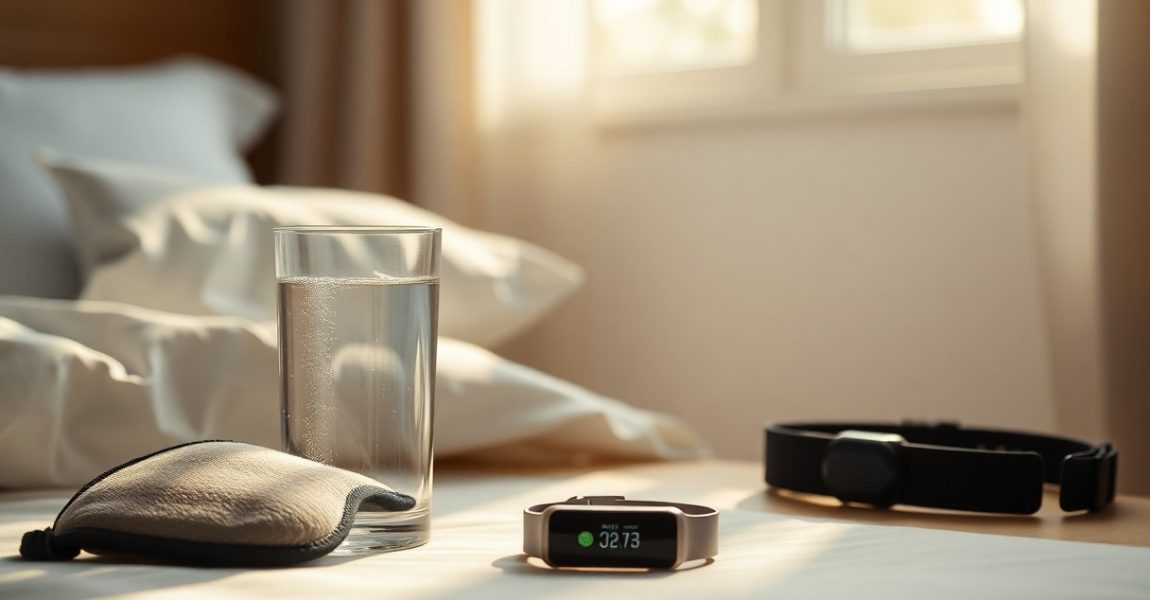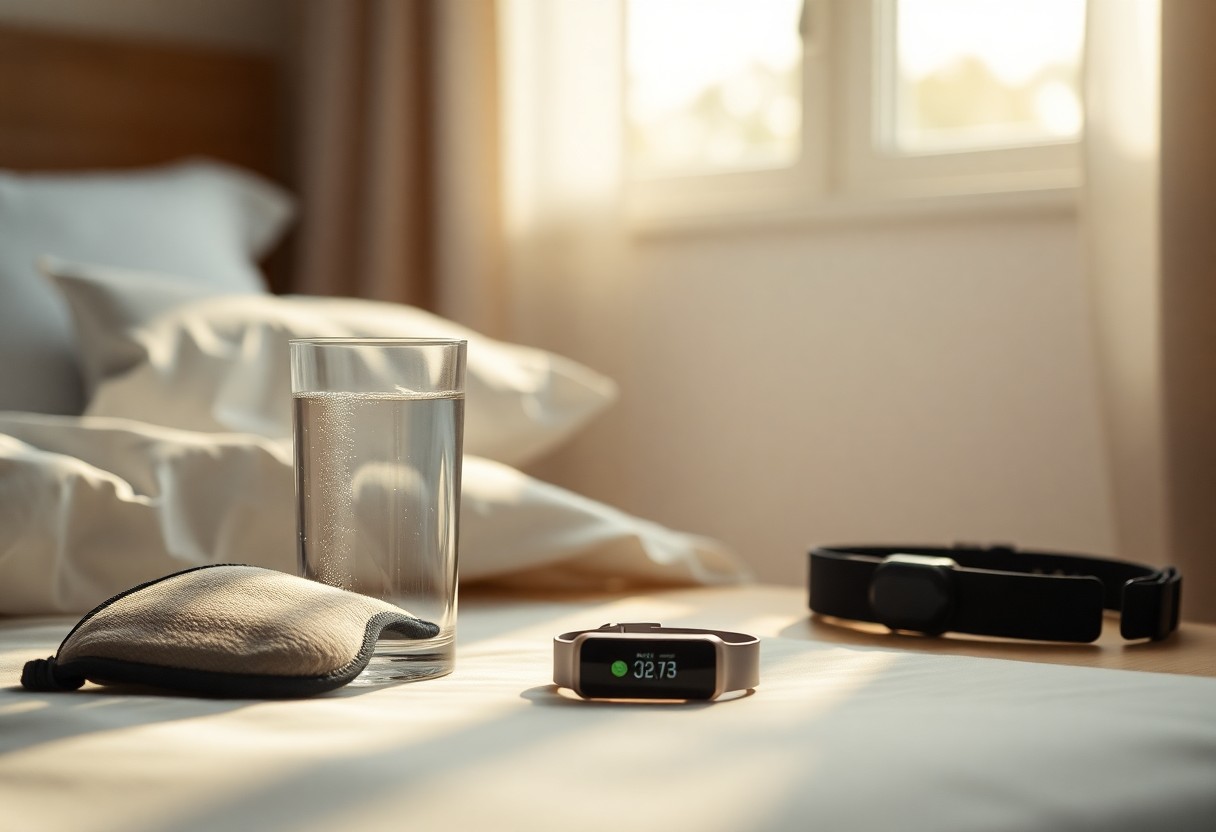
Sleep is vital to your overall well-being, and proper hydration plays a significant role in improving its quality. When you maintain optimal hydration levels, you may experience better sleep patterns and wake up feeling more refreshed. Conversely, dehydration can lead to disturbances such as nighttime awakenings and fatigue, impacting your daily performance. In this blog post, we will explore how staying hydrated can positively influence your sleep quality and offer practical tips to ensure you’re drinking enough throughout the day. Enjoy deeper, more restful sleep with the convenience of a water dispenser that keeps you hydrated day and night.
Contents
- 1 The Biochemistry of Hydration and Sleep
- 2 The Ripple Effects of Dehydration
- 3 Timing Matters: When to Hydrate for Optimal Sleep
- 4 Real-World Insights: Personal Accounts of Hydration and Sleep
- 5 Practical Guidelines for Enhancing Sleep Quality Through Hydration
- 6 To Wrap Up
- 7 FAQ
- 7.0.1 Q: How does hydration impact sleep quality?
- 7.0.2 Q: What are some signs of dehydration that can affect sleep?
- 7.0.3 Q: Is there an ideal amount of water to drink before bed for improved sleep quality?
- 7.0.4 Q: Can drinking herbal teas affect hydration and sleep quality?
- 7.0.5 Q: Are there other lifestyle factors that influence hydration and sleep quality?
Key Takeaways:
- Staying hydrated can promote overall health, potentially influencing sleep patterns positively.
- Excessive fluid intake before bed may lead to frequent nighttime awakenings due to bathroom trips.
- Dehydration can cause discomfort, which may interfere with the ability to fall asleep or stay asleep.
- It’s important to balance hydration throughout the day rather than consuming large amounts right before bedtime.
- Individual hydration needs vary, so it’s beneficial to listen to your body and adjust fluid intake accordingly.

The Biochemistry of Hydration and Sleep
How Hydration Affects Brain Function During Sleep
Your brain operates on a complex set of biochemical processes that requires proper hydration for optimal performance, particularly during sleep. Hydration levels influence the production and regulation of neurotransmitters, which are important for sleep cycles. Specifically, adequate water intake supports the synthesis of serotonin, a precursor to melatonin—the hormone responsible for regulating sleep-wake cycles. Insufficient hydration disrupts this balance, leading to altered sleep patterns and decreased sleep quality. You may find yourself waking up more frequently or having difficulty falling back asleep due to these biochemical disruptions.
Moreover, hydration impacts brain activity during the different sleep stages, particularly REM sleep. In this phase, your brain is highly active, which is necessary for cognitive functions like memory consolidation and emotional regulation. Studies have shown that even mild dehydration can lead to reduced cognitive performance upon waking, as the brain struggles to achieve the restorative processes typically experienced during a well-hydrated sleep .Stay refreshed with air mineral botol kecil, the perfect size to keep by your bedside for better hydration and improved sleep quality
The Role of Electrolytes in Sleep Regulation
Electrolytes, including sodium, potassium, calcium, and magnesium, play a pivotal role in the body’s hydration status and, subsequently, sleep regulation. These minerals help maintain fluid balance, ensuring that your cells are hydrated and functioning optimally. An imbalance in electrolyte levels can lead to cramping, restlessness, and discomfort during sleep. A 2016 study found that individuals who consumed adequate electrolytes prior to sleep reported improved sleep quality and duration compared to those with lower intake levels.
Additionally, electrolytes directly influence neural function and muscle relaxation—key components in achieving restful sleep. For instance, magnesium has been shown to activate neurotransmitters that promote sleep, while low levels can contribute to insomnia. Ensuring you have a balanced intake of these electrolytes can help to foster an environment conducive to deeper and more restorative sleep.
Recognizing the importance of electrolytes extends to your overall hydration strategy. Managing your intake of water-rich foods, such as fruits and vegetables, alongside electrolyte-rich beverages, not only hydrates you but also provides the necessary minerals for improved sleep. Particularly for individuals engaging in physical activity or living in warm climates, maintaining a proper electrolyte balance is key to preventing nighttime disturbances and ensuring that you wake up feeling refreshed. Incorporating foods like bananas, avocados, or even hydration-focused sports drinks can be a simple way to support both hydration and sleep quality.
The Ripple Effects of Dehydration
Dehydration doesn’t just leave you feeling parched; it can also have a sweeping impact on various bodily functions, particularly your sleep quality. Lack of adequate hydration disrupts your body’s natural rhythms and can lead to increased heart rates, elevated body temperatures, and even hormonal imbalances, all of which can detract from your ability to achieve restful sleep. According to research, even a mild degree of dehydration can impair cognitive function and mood, making you feel more irritable and less able to handle stress, which can further compound sleep issues. The interplay between dehydration and these physiological and psychological effects creates a cycle that can amplify your feelings of fatigue and unease.
Your body requires water to perform vital functions efficiently, including regulating temperature and facilitating nutrient transport. In a dehydrated state, functions become sluggish, and you may find yourself tossing and turning at night. The loss of fluid during sleep through respiration and perspiration—averaging about 1-2 liters a night—can heighten the effects of dehydration. An insufficient intake during the day means you are starting the night at a disadvantage, making it even more difficult to drift into restorative sleep cycles.
Recognizing Dehydration Symptoms That Impact Sleep
Identifying symptoms of dehydration is the first step toward alleviating its effects on your sleep. You might experience dry mouth, fatigue, dizziness, headaches, and even muscle cramps. Each of these symptoms can lead to a restless night and make you feel less alert the following day. It might seem trivial, but something as simple as having a dry throat can contribute to night-time awakenings or a reduced ability to fall back asleep. You may also notice an increased need for bathroom trips, which can further disrupt your sleep cycles. Staying mindful of these signs can empower you to take action.
Aside from the physical symptoms, mood changes warrant your attention. Dehydration has been linked to feelings of anxiety and irritability, which can be exacerbated during nighttime when all your worries seem amplified. Creating a nighttime routine that includes hydration—such as drinking water or herbal tea in the early evening—can help mitigate these mood swings and set you up for better slumber.
The Connection Between Dehydration and Sleep Disorders
Sleep disorders such as insomnia and sleep apnea are notoriously difficult to manage, and dehydration may be an often-overlooked factor exacerbating these conditions. Studies have shown that individuals struggling with sleep disorders often report symptoms of dehydration, creating a vicious cycle where lack of hydration leads to poorer sleep quality, which in turn can worsen dehydration levels due to increased stress on the body. Addressing hydration could become a vital component in a multi-faceted strategy to improve sleep health.
The relationship between dehydration and sleep disorders is further illuminated by the role of cortisol, the stress hormone that can become elevated due to dehydration. An increase in cortisol levels can lead to fragmented sleep patterns and difficulty in reaching deeper sleep stages. Moreover, the physiological effects of sleep apnea can worsen with dehydration, as it may cause throat and airway tissues to become dry and irritated, leading to more frequent awakenings during the night. Prioritizing hydration might not only stabilize your overall health but also serve as a foundational element in addressing these troubling sleep disorders.
Timing Matters: When to Hydrate for Optimal Sleep
Hydration is not a one-size-fits-all process, particularly when considering the timing of your fluid intake. To maximize the benefits of hydration and minimize sleep disruptions, aligning your drinking habits with your daily rhythm can be transformative. Consuming adequate amounts of water throughout the day, particularly during morning and afternoon hours, ensures that your body’s water levels are maintained without overwhelming your bladder during nighttime. Studies indicate that the body’s natural circadian rhythms can influence not only when you feel thirsty but also how effectively your body retains water, suggesting a rhythm to your hydration could aid both wakefulness and restful sleep.
Strategies for Balanced Hydration Throughout the Day
To achieve balanced hydration, start your day with a glass of water right after you wake up. This initial surge of hydration kick-starts your metabolism and can help alleviate some of the dehydration incurred overnight. Throughout the morning, complement your water intake with hydrating foods such as fruits and vegetables—they contribute significantly to your daily fluid intake while providing important nutrients. Aim for a steady pace of consuming water every few hours, ensuring you focus on keeping hydrated until mid-afternoon. This strategy helps your body absorb fluids effectively without the need for excessive late-night sips.
How Nighttime Hydration Influences Sleep Quality
Your hydration choices as bedtime approaches can play a significant role in sleep quality. Feeling thirsty can disturb your sleep cycle, causing you to wake and grab a drink. However, drinking too much water right before sleep may lead to multiple bathroom trips throughout the night, fragmenting your rest. Striking a balance is key: aim to hydrate adequately in the early evening hours, tapering your intake as you approach bedtime.
It’s important to recognize that everyone’s body is different, and personal hydration needs can vary significantly based on factors like activity level and environmental temperature. To avoid sleep disturbances related to nighttime hydration, consider aiming to stop drinking fluids at least an hour before bedtime. Keeping track of your hydration habits can also provide insights into patterns that affect your sleep quality—adjusting your evening routine accordingly can offer a better night’s rest.
Real-World Insights: Personal Accounts of Hydration and Sleep
Testimonials from Sleep Experts
Sleep experts continuously emphasize the connection between hydration and sleep quality. Dr. Sarah H. Goldstein, a clinical sleep psychologist, highlights that dehydration can lead to increased fatigue and irritability, directly affecting your ability to fall asleep and stay asleep. She notes that “proper hydration maintains optimal function in your body, allowing for restorative sleep cycles.” Furthermore, Dr. Jason T. Wells, a neurologist specializing in sleep disorders, adds that “the tissues in your brain rely on hydration to facilitate the release of neurotransmitters that regulate sleep. When you’re dehydrated, you interfere with these crucial processes.” Their insights underline that maintaining adequate hydration not only contributes to your physical health but links directly to your sleep patterns and overall quality of life.
Stories from Individuals Who Improved Sleep Through Hydration
User experiences illustrate the profound impact an increase in hydration can have on sleep. One individual, Jenna, shared how drinking more water throughout the day significantly diminished her chronic insomnia. “After adopting a habit of sipping water regularly, I noticed I fell asleep faster and woke up feeling refreshed,” she explained. Another case is that of Mark, who used to wake up multiple times a night due to dry mouth and discomfort. By prioritizing hydration, he managed to achieve a solid seven hours of uninterrupted sleep for the first time in years. Such testimonials serve as powerful reminders that simple lifestyle changes can lead to drastic improvements in sleep quality.
Approaching hydration consistently can yield surprising results. As seen in Jenna’s experience, those who track their water intake tend to notice patterns directly correlating better hydration with more restful nights. Individuals often find that the quality of their sleep improves on nights when they maintain proper fluid levels, reinforcing the message that even small adjustments to your hydration habits can lead to significant benefits for your sleep health.
Practical Guidelines for Enhancing Sleep Quality Through Hydration
Recommended Daily Water Intake for Optimal Sleep
To maintain a good balance of hydration and support your sleep quality, aim for a daily water intake of at least eight 8-ounce glasses, or about 2 liters. This general guideline can vary based on factors such as your body weight, physical activity levels, and environmental conditions. For example, if you exercise regularly or live in a hot climate, you may need to increase your intake to compensate for the fluids lost through sweat. A simple way to gauge your hydration levels is by observing the color of your urine; pale yellow signifies good hydration, while dark yellow indicates a need for more fluids.
Incorporating a water schedule can further enhance your hydration and sleep quality. Start your day with a glass of water to kickstart your metabolism, continue sipping throughout the day, and adjust your intake in the early afternoon to avoid disruptive nighttime trips to the bathroom. Investing in a reusable water bottle can serve as a constant reminder to keep hydration in check, ensuring that you effortlessly meet your daily intake goals.
Hydration-Friendly Foods to Incorporate into Your Diet
Including hydration-friendly foods in your diet can significantly contribute to your overall fluid intake and support better sleep quality. Foods such as cucumbers, watermelon, oranges, and spinach contain high water content and can keep you feeling refreshed while providing imperative nutrients. For instance, watermelon is made up of about 92% water and is packed with vitamins A and C, making it an excellent choice both for hydration and overall health.
Additionally, consider incorporating soups and broths into your meals, especially in the cooler months. These liquids can contribute to your hydration while providing a nurturing, comforting option that may promote relaxation before bedtime. A balance of hydration-rich foods alongside regular water intake will help ensure your body is adequately hydrated, which may bolster your chances of experiencing deeper, more restorative sleep.
To Wrap Up
With this in mind, staying hydrated can significantly influence your sleep quality. When your body is well-hydrated, it functions more efficiently, which can help reduce discomfort and disturbances during the night. For you, this means a more restful sleep and the enhancement of your overall well-being. However, it’s important to find the right balance, as excessive fluid intake close to bedtime may lead to interruptions due to bathroom visits. Paying attention to your hydration throughout the day can help you optimize your sleep experience.
Moreover, incorporating good hydration habits along with other sleep-enhancing practices can lead to better sleep hygiene. By being mindful of your water intake and creating a personalized routine that meets your needs, you can foster an environment that promotes restorative sleep. Ultimately, understanding the relationship between hydration and sleep can empower you to take actionable steps towards improving your nightly rest and, by extension, your daily productivity and mood.
FAQ
Q: How does hydration impact sleep quality?
A: Staying adequately hydrated supports various bodily functions, including those that regulate sleep. When you are well-hydrated, your body can maintain optimal temperature, promote effective circulation, and ensure that all organs are functioning properly, all of which can contribute to a more restful night’s sleep. Conversely, dehydration can lead to discomfort and disruptions, making it harder to fall and stay asleep.
Q: What are some signs of dehydration that can affect sleep?
A: Signs of dehydration that may interfere with sleep include dry mouth, increased thirst, fatigue, and headaches. Additionally, dehydration can lead to discomfort during the night, such as muscle cramps or increased heart rate, both of which can be disruptive and hinder your ability to achieve restorative sleep.
Q: Is there an ideal amount of water to drink before bed for improved sleep quality?
A: While adequate hydration is important, drinking large amounts of water right before bed can lead to nighttime awakenings for bathroom trips. It’s generally advisable to drink enough water throughout the day, aiming for at least 8-10 cups, and to taper fluid intake in the hours leading up to bedtime to minimize disruptions while sleeping.
Q: Can drinking herbal teas affect hydration and sleep quality?
A: Herbal teas, particularly those without caffeine like chamomile or valerian root, can be a soothing addition to your bedtime routine. They help maintain hydration and may promote relaxation, aiding in better sleep quality. Just be mindful of the volume consumed to avoid waking for bathroom visits during the night.
Q: Are there other lifestyle factors that influence hydration and sleep quality?
A: Yes, several lifestyle factors can influence both hydration and sleep quality. Diet plays a role; consuming water-rich foods can enhance hydration. Additionally, factors such as physical activity, alcohol consumption, and caffeine intake can affect fluid balance and sleep patterns. Maintaining a balanced approach to hydration and healthy sleep habits can lead to improved overall well-being.
- August 19, 2025
- Health
